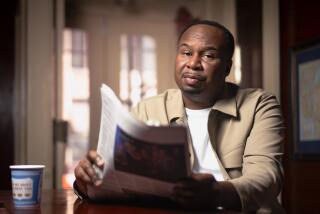A host still looking for himself
The QUALITY of an interview has, naturally, a great deal to do with the quality of the interviewer. But it may have just as much to do with the perceived quality of the interviewer. In other words, is the person asking the questions worthy of receiving a greater-than-usual dose of truth?
Fareed Zakaria, host of the new CNN Sunday talk show âFareed Zakaria GPSâ (10 a.m.), comes to that battle well equipped. The editor of Newsweek International, he has been a frequent talking head on a range of shows in recent years (including amusing turns on âThe Daily Showâ) and was, for 2 1/2 years, the host of the PBS talk show âForeign Exchange With Fareed Zakaria.â
On âFareed Zakaria GPSâ (in the showâs usage, âGPSâ stands for Global Public Square), which premiered June 1, time is split between a longish interview with a key political figure and a round-table discussion, led by Zakaria, with a rotating cast of experts.
Zakariaâs status has helped him land high-profile interview subjects in the first weeks of his fledgling show: Tony Blair, Henry Kissinger, Condoleezza Rice (billed as Riceâs first in-depth television interview in two years). As an interlocutor, Zakaria has a natural calm, and is utterly comfortable discussing the range of foreign crises, from the war in Iraq to Irelandâs recent rejection of the Treaty of Lisbon, which would have paved the way for the creation of a president of the European Union, among other reforms.
There has been little discussion of Africa as of yet or Hugo Chavez or the recent shifts in power in Cuba. Nevertheless, Zakaria is refreshingly open in his viewpoints on the subjects he does take on. When interviewing Kissinger, he asked sincerely about the security concerns of Iran, not just the security concerns caused by Iran. After a brief news item on the recent protests in South Korea over the importation of U.S. beef, Zakaria noted, âJust one more example that being seen as pro-American remains a political problem in many parts of the world.â
One-on-one, though, Zakariaâs skepticism can get lost. He exudes a certain coziness with his guests, even the ones who are perhaps deserving of more circumspection. It has in moments bordered on complicity. Toward the end of his time with Kissinger, he asked the statesman, who had just turned 85, âIs your strategy now to simply outlive every critic that you have?â This is not, strictly speaking, a question. Instead, it is a wink -- to Kissinger, who could dodge (though he gave a better answer than the question deserved) and to the audience, to remind them that even though Zakaria had been playing nice, he was sympathetic to the opposition or at least aware of them.
He was tougher on Rice, opening with a carefully worded broadside about Gaza: âI can certainly say from my travels that the hypocrisy of saying we want democracy and then the minute they vote for Hamas, saying weâre gonna try to strangle it is loudly proclaimed.â (A transcript of the interview, with several questions that did not make it to air, is on the U.S. Department of State website.) Still, this had all the tension of breakfast at Davos or Sun Valley. The BBCâs Jeremy Paxman of âNewsnightâ never would have abided her evasions.
Nor would Tim Russert have. In the wake of Russertâs passing, Sunday feels wide open. Tom Brokaw will anchor âMeet the Pressâ until the elections. ABC has the well-regarded âThis Week With George Stephanopoulos,â and CBS has âFace the Nationâ with longtime host Bob Schieffer. Zakaria, an Indian-born, Yale- and Harvard-educated Muslim, offers perspectives that none of these other shows can. Earlier this year, he released âThe Post-American World,â his third book, about the decreasing power of the United States in the evolving geopolitical climate.
Global positioning device
He IS astute enough to understand that the average American viewer might not be comfortable with that reality. But savvily, Zakaria positions himself as a true cosmopolitan, a liaison between them and us. On his first show, Zakaria introduced his mission thusly: âI know that right now to a lot of people, the world looks like a grim place. Almost every day youâre bombarded with frightening headlines, stories of out-of-control governments and terrorists who want to kill you. But beyond those headlines, the picture is actually much brighter.â
Note the use of the second person: Itâs part genial and avuncular and just a touch condescending. Inviting and exclusionary all at once.
But even though his interviews have been comfortable, when moderating his panel, Zakaria recedes; the contrast between him and CNNâs chief international correspondent, Christiane Amanpour, who has appeared on the panel three times, seemingly to help anchor it, has been striking.
Zakaria has attempted to strike notes of humor, with varying success. Two weeks ago, he said the show was getting rid of its dizzying background graphics, which were, if nothing else, distinctive. âThe person responsible for this is now at Guantanamo Bay,â he joked.
And in the premiere episode, after a lengthy chat with former British Prime Minister Tony Blair, Zakaria showed a clip from a British comedy show, âDead Ringers,â that included vicious impersonations of Blair and President Bush. (Blair presumably was no longer in the studio.) It was a vicious send-up and offered a glimmer of possibility that Zakaria might not be so cozy as he seemed. But at the end, after a laugh, he offered âapologies to Mr. Blair and, of course, President Bush.â That sort of comedy is not a trick Zakaria has repeated. After all, the president may come by for a chat.
More to Read
The complete guide to home viewing
Get Screen Gab for everything about the TV shows and streaming movies everyoneâs talking about.
You may occasionally receive promotional content from the Los Angeles Times.






